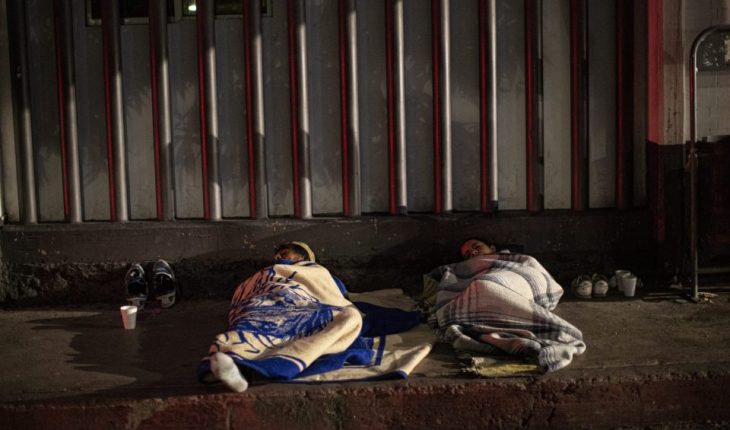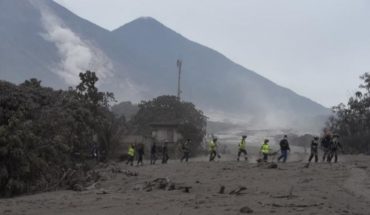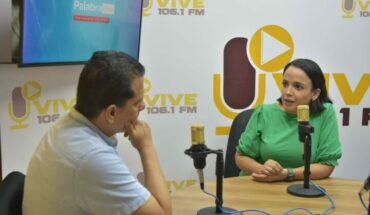“I too was one I didn’t believe. Until my brother got sick.” Ramón has been sleeping on the outside of the Deer Zone 1A General Hospital for three nights and acknowledges that it was previously the skeptics, who did not finish assuming the existence of COVID-19. Until he had to bring his brother in a cab and leave him in without knowing what’s going to happen to him. He hasn’t moved from the hospital door since. And he doesn’t plan to do it. Coughs lightly and protects with a head cover, but says it’s fine.
It is Wednesday, June 3, a few minutes pass of the 22 hours and around it, outside the emergency area of the hospital Venados, there are about 25 people. Some are relatives of patients suspected of developing COVID-19. Others came because of a different medical problem. Everyone intends to spend the night out in the open.
“I’m staying because it’s easier for me. So, if you go out to report, I’m here,” Ramon explains.
The COVID-19 pandemic and the possibility of spreading has not stopped a regular practice in hospitals in Mexico City: that of relatives staying overnight in the vicinity of health facilities. They wait for doctors to give them the daily report, ask them to buy medicines, or, at best, arrive with their family member’s discharge.
The authorities insist that it is not advisable to wait outside the hospitals. When the patient arrives the first time they are asked to stay while the triage is performed, the first evaluation in which it is determined what to do with the patient. However, the option to report remotely is then offered.
The Mexican Social Security Institute (IMSS) has arranged the phone 800 623 2323 and the email [email protected] so that family members can receive the report without having to stay 24 hours outside the hospital facilities and risk contagion. However, there are families still staying outside medical centers such as the “Venados” or the General Hospital.
Ramon says he prefers to wait there because going home in Sant Fe and returning is very expensive. In addition, he has asked for a leave at work and he can think of nothing better than staying as close as possible to his brother.
He comes prepared, with blankets and some snacks. He’s not the only one. In one of the corners next to the stairs there are already three people lying down, fully covered and on the ramp that separates the entrance to the hospital from the access of the ambulances, another man has lay down and prepares to spend the night. A week ago, a family settled with a tent for several days, but they’ve already left. On the sidewalk, a man sells candy and cigarettes and two taxi drivers warn of the size of the cockroaches walking through the tree where another relative waiting for a possible coronavirus sufferer would sit.
Suddenly, the conversation is interrupted. An ambulance arrives and everyone is silent. From inside they take out one of the patients completely isolated. It’s a possible case of coronavirus. Those who expect have already gone through this very process. Some by ambulance. Ramon and his son, in a taxi they had to hurry because his brother was short of breath. The inrupting of the medicalized vehicle generates a moment of group empathy. Another sick man. It could be the brother, the mother, or the uncle of each of them. There’s a kind of collective condolence in the air.
“They tell us it’s a little serious. But at the moment we’re just waiting for them to say something because until they see what’s up. We don’t know when he’ll be able to get out,” Ramon says about his brother. He reportedly became infected working as a security guard in a company. He had been ill for several days until he got worse and they had to bring him all the way. Now all that’s left to wait.
Alejandra doesn’t want to give her name and she’s here because she says she doesn’t trust her. He complains that his relative, with symptoms of possible COVID-19, was brought in from Troncoso Hospital a day earlier without even telling them. “They forcibly moved him. But there had to be a relative with him in case anything happened to him. However, when we arrived he was gone and no one had warned us that he was brought here,” he protested. No one has explained to him why he was changed from hospital.
“A doctor went out to comment on the status, we were told they were going to give us another report, but there was a shift change and they didn’t say anything anymore,” she says.
The woman comes with a purse in which she wears some coat, just in case. He says the area causes him unease, that he believes there is a risk of contagion. “We’ve been walking away all day, because people don’t keep their distance. It’s a risk, because the measures are not metand here we are exposed,” he says.
The same scene is repeated at the General Hospital. The camp here is more sophisticated. There are people sleeping under blankets on the banks located outside the emergency department and people who bring the car as temporary accommodation. This is a hybrid hospital so arriving patients may have symptoms of COVID-19 or come with the usual problems that medical centers occupied before the coronavirus.
At the end of May, Karina, originally from Iztapalapa, was waiting for her in-law, Laura.
He came in with a short breath. It was a long journey. We took her to a private institution and they said she brought high sugar. We had to put her in. We went to the private hospital, because it was wrong. From there to clinic 31, but they told us they couldn’t take care of her, that we had to look for a hospital,” she explains.
In the end, she was admitted with coVID19 symptoms on Friday, May 22. As Karina explains, “While she was in the ER we couldn’t leave, a relative had to stay 24 hours.”
That’s why the family waits on the street, sitting on a bench and with the car to sleep. Together with Viridiana, who waits for her father, who fell ill after drinking adulterated alcohol, they let hours play cards and chat.
They say they have two major discomforts: rats and franeleros, who charge them 40 pesos to keep the vehicle parked every time they change shifts, even if they haven’t moved it.
“She started at home in pain, spent 15 days with flu, angina pain and everything got complicated,” Karina explains. The anguish you expect is cruel. At the time, Laura had not yet tested positive and was in a wing for patients with respiratory problems but without confirmation of coronavirus.
There on the outside of the hospital, great complicities are woven. The pain of not knowing what happens to a sick relative, the uncertainty until the doctors come out with the day’s report, the conversations about medications and how expensive they are.
On June 1, two weeks after staying every night outside the General Hospital, Karina received the worst news in the world: her mother-in-law failed to get over the coronavirus. Around him, other relatives wait. It was a regular practice before COVID-19 and the pandemic is not finished with it. There is fear of contagion, but some believe that they have no choice but to expose themselves.
What we do in Animal Político requires professional journalists, teamwork, dialogue with readers and something very important: independence. You can help us keep going. Be part of the team.
Subscribe to Animal Politics, receive benefits and support free journalism #YoSoyAnimal.
translated from Spanish: Relatives of COVID patients sleep outdoors waiting for news
June 12, 2020 |





